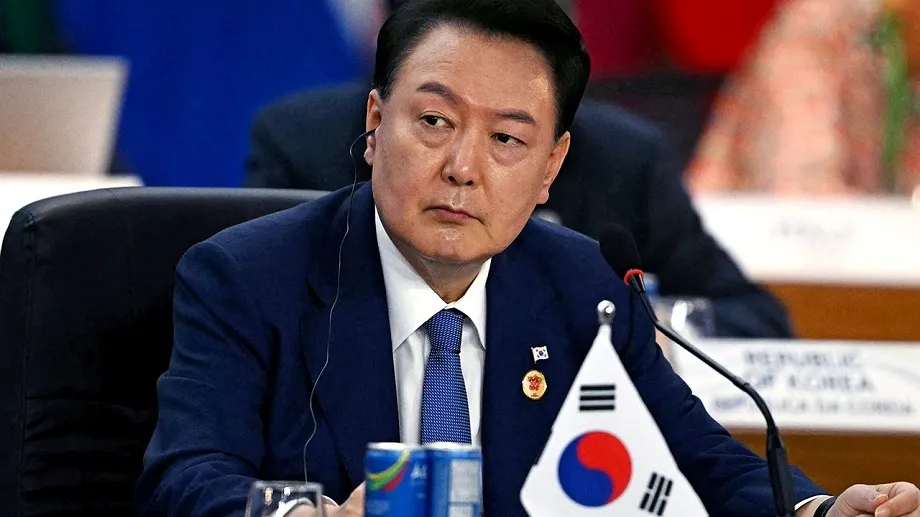Islamabad/Seoul, April 04: South Korea’s Constitutional Court upheld the impeachment of President Yoon Suk Yeol on Friday, removing him from office over his controversial martial law declaration last year, which led to the country’s most severe political crisis in decades.
The verdict brings an end to months of political uncertainty that had overshadowed key domestic and foreign policy decisions, particularly in dealing with US President Donald Trump’s administration amid economic challenges in Asia’s fourth-largest economy.
Under the South Korean Constitution, a new presidential election must be held within 60 days. Until then, Prime Minister Han Duck-soo will serve as acting president.
A Turning Point for South Korea
Political analyst Leif-Eric Easley of Ewha University in Seoul described the ruling as a crucial moment:
“The Constitutional Court’s unanimous ruling has removed a major source of uncertainty. And not a moment too soon, given the challenges the next administration will face—including North Korea’s military threats, China’s diplomatic pressure, and Trump’s trade tariffs.”
Court’s Justification for Impeachment
Acting Chief Justice Moon Hyung-bae ruled that Yoon’s decision to declare martial law on December 3 was an unconstitutional act, exceeding the powers granted to the presidency. He described it as a serious threat to democracy, stating:
“(Yoon) committed a grave betrayal of the people’s trust, who are the sovereign members of this democratic republic.”
Moon further explained that the martial law declaration led to widespread chaos across society, the economy, and foreign relations.
Public Reaction and Market Response
The court’s decision was met with polarized reactions.
Thousands of anti-Yoon demonstrators, some of whom had camped overnight, erupted in celebration, chanting, “We won!” Meanwhile, Yoon’s supporters, gathered near his official residence, reacted with outrage, with one protester arrested for vandalizing a police bus, according to Yonhap News Agency.
Despite the political upheaval, financial markets remained stable.
The South Korean won strengthened by 1%, trading at 1,436.6 per dollar by 2:49 a.m. GMT (7:49 a.m. PKT). The KOSPI index saw a 0.7% decline, in line with market expectations that the court would uphold the impeachment.
Court Dismisses Yoon’s Defense
The Constitutional Court rejected Yoon’s argument that martial law was necessary to counter the opposition party’s abuse of its parliamentary majority. Instead, it ruled that there were legal avenues to resolve such disputes.
Chief Justice Moon Hyung-bae emphasized that Yoon’s decree was procedurally flawed and lacked justification. The court further condemned his use of military force against parliament, calling it a serious violation of the constitutional separation of powers.
Political and Government Response
The interim leader of Yoon’s ruling People Power Party, Kwon Young-se, issued a public apology, acknowledging the court’s decision and vowing to cooperate with the acting president in stabilizing the country.
Acting President Han Duck-soo assured citizens that he would oversee a peaceful and orderly transition, ensuring the upcoming election proceeds smoothly.
Meanwhile, Finance Minister Choi Sang-mok is set to convene an emergency meeting with the Bank of Korea governor and financial regulators to assess economic stability.
Yoon Faces Criminal Trial
Following his impeachment, 64-year-old Yoon Suk Yeol is set to face trial on insurrection charges related to his martial law declaration.
Yoon had already made history as the first sitting South Korean president to be arrested on January 15, though he was released in March after a court revoked his arrest warrant.
The Martial Law Crisis: A Failed Power Move
The crisis stemmed from Yoon’s decision to declare martial law, which he claimed was necessary to eliminate “anti-state” elements and counter the opposition Democratic Party’s alleged abuse of its parliamentary majority.
However, his attempt to impose military rule faced immediate resistance.
Just six hours after declaring martial law, he was forced to lift the decree when parliamentary staff—using barricades and fire extinguishers—successfully fended off special operations soldiers who had arrived by helicopter in an attempt to break into parliament.
Lawmakers then proceeded to vote against martial law, further sealing Yoon’s political downfall.
Despite this, Yoon has maintained that he never intended to fully enforce military rule, downplaying the crisis by stating that no one was harmed.
With his presidency now over and legal troubles ahead, South Korea braces for a new political era, with the countdown already ticking for a fresh election in the coming weeks.









